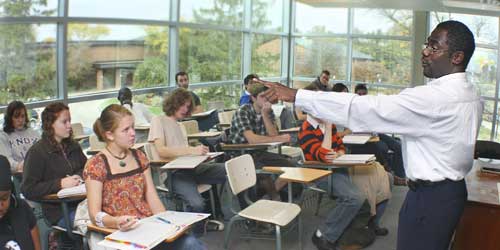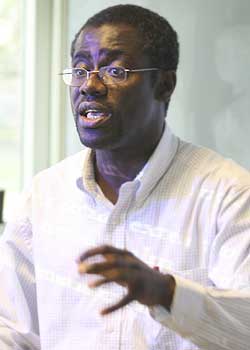

Venture Boldly

Office of Communications
2 East South Street
Galesburg, IL 61401

An African scholar at Knox College asserts that African problems ? from the economic challenges posed by globalization, to military crises, such as the conflict in the Darfur region of Sudan ? can only be solved by African leadership.
Eric Edi, assistant professor of integrated international studies, argues for an "African-centered perspective" in his new book, "Globalization and Politics in the Economic Community of West African States," published recently by Carolina Academic Press, in its series Studies on Globalization and Society.
Edi is a Fulbright scholar from Cote d'Ivoire who has studied in the United States since 1999. His research covers the effects of globalization on politics in West Africa.
In his book, Edi writes that the 15 nations of West Africa ? with a total of more than 200-million people ? are "among the world's most economically disadvantaged countries."
At the same time, Edi contends, West Africa "represents an extensive market that can attract both African and non-African partners."
In the book, Edi discusses various reasons offered by other scholars for Africa's lagging development ? including dictators, both civilian and military; ethnic strife; political corruption; and economic mismanagement. Equally important, Edi writes, have been the elites' neglect of the peasants ? he calls them "Africa's most productive force" ? and the lack of cooperation among nations.
Edi suggests that the Economic Community of West African States, or ECOWAS, an organization created in 1975, provides a good model for cooperation among African nations. The four largest four nations in ECOWAS ? Nigeria, Senegal, Ghana and Cote d'Ivoire ? need to "strengthen unity among themselves," and then "raise a strong and effective diplomatic force to mediate in conflict and monitor the discourse on democracy in West Africa," Edi writes.
Edi argues that military interventions by outside powers have failed.
"I question the nature of the agenda and the outcomes of outside military intervention," Edi said recently, commenting on European Union plans to send a peacekeeping force to the Darfur region.
"I am for a strong African military presence in Darfur," Edi said. "Considering the relatively poor success of United Nations and foreign forces missions in Africa, I believe it would be better for an African force to have preeminence in African crises."
As an example, Edi cites the Economic Community of West Africa Cease-fire Monitoring Group, or ECOMOG, which should intervene, as it did in Sierra Leone in 1997, to support democracy and help "restore political and constitutional orders."
Edi contends that Africa also needs to create democratic institutions that empower women and youths, boost political education, and support the continent's indigenous "socialistic and communalistic [economic] ideologies."
Edi completed his B.A. and M.A. degrees at the University of Cocody in Cote d'Ivoire and his doctorate at Temple University. He has taught at Knox since 2006.
Founded in 1837, Knox is a national liberal arts college in Galesburg, Illinois, with students from 45 states and 44 nations. Knox's "Old Main" is a National Historic Landmark and the only building remaining from the 1858 Lincoln-Douglas debates.


Published on November 20, 2007